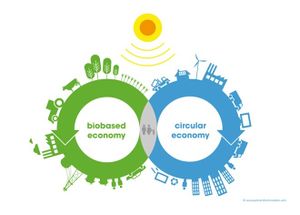Circular Economy
The world is heading towards a new economy. Value creation, closed-loops systems and social innovation are important ingredients in that new economy.
Contrary to our current economy, based on a "take, make and dispose” extractive industrial model, the circular economy is restorative and regenerative by design. Relying on system-wide innovation, it aims to redefine products and services to design waste out, while minimising negative impacts. Underpinned by a transition to renewable energy sources, the circular model builds economic, natural and social capital. The principles of the circular economy are first described in the book Cradle to Cradle written by chemist Michael Braungart and architect William McDonough. The circular economy builds on this knowledge and focusses more on closing the loops in a viable new business model. In this minor you will obtain both theoretical knowledge of the circular economy concept and learn to apply it in practice.
In this minor we will work on research assignments from companies and/or governmental institutes, which are tackled by inter-disciplinary project teams. Economics students work closely together with chemistry students, biologists, engineers, logistics students, or students from a social domain. You will develop a new business model or a transition strategy. Radical innovations are invented, and new products or product-service systems are designed.
In this dynamic course, the research projects are accompanied with courses, excursions and guest lectures of transition experts, (social) entrepreneurs, eco-designers, policy makers, etc. Students will not only develop circular economy skills in their own domain, but by co-creation you will become aware of the integral approach of transition towards a new economy.
Would you like to work with us in a minor?
In the minor Becoming Fit for the Future (30 ECTS, or download the brochure) you learn how to set up, carry out and defend practically-orientated research. See also the brief description of the content above. Internally (to HZ University of Applied Sciences), no conditions apply other than that the minor must be successfully completed. Externally, other conditions might apply - ask your own institution about this. For participation in this minor, the conditions set down in the implementation regulations of your Bachelor’s programme apply.
Learning goals
- You are acquainted with the Circular Economy model of the Ellen Mc Arthur foundation. You apply systems thinking in Circular Economy concepts.
- You are able to understand the consequences and the value of the different cascade levels within the Ellen Mc Arthur model.
- You are able to make a context map of the existing situation in social, economic and technological terms (EMM)
- You are able to design a CE business model in co-creation with students and experts of other disciplines.
- You are able to identify the right stakeholders.
- You are able to evaluate the value of a circular business model in economic, technological, social and ecological terms.
A MOOC about Circular Economy is a mandatory aspect of this minor. You will pay 50 euro for a certificate to prove you have accomplished the MOOC successfully. The minors Global Citizenship and Circular Economy are aligned with each other, however, students can also take one of these two minors.
Contact
For more information about Circular Economy get in touch with Ingrid de Vries (lecturer, researcher and project coaching).

